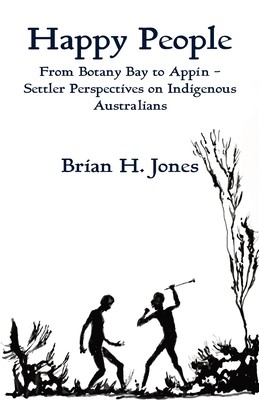
- We will send in 10–14 business days.
- Author: Brian H Jones
- Publisher: Ginninderra Press
- Year: 2021
- Pages: 222
- ISBN-10: 176109081X
- ISBN-13: 9781761090813
- Format: 14 x 21.6 x 1.3 cm, softcover
- Language: English
- SAVE -10% with code: EXTRA
Reviews
Description
Less than sixty years after the ships of the First Fleet arrived in Sydney Cove, John Eyre wrote that Indigenous Australians were 'strangers in their own land'. Also, he wrote that 'hungry, and famished, they wander about begging'. How did the lives of Indigenous Australians deteriorate so quickly?
With this question in mind, Happy People traces the perspectives of settlers on Indigenous Australians, from the first settlement during 1788 until the military excursions and Governor Macquarie's 'emergency' measures put a forceful and localised end to the conflict on the southern border of the colony during 1816-17. Happy People shows how the settler's first perspectives were complex mixes of aversion to the 'savagery' of the Indigenous people, refusal to recognise the reality of Indigenous resistance to the land theft that was taking place, curiosity about the new and 'exotic' culture, and recognition of individuality and personality of leading Indigenous figures. Although there was a temporary 'rapprochement' between the colonists and some of the Indigenous people of the Harbour region when Bennelong came to an understanding with Governor Phillip, within a short time the settler perspective hardened to viewing Indigenous people as little more than annoying, unappealing obstacles to colonial expansion and land possession, and as threats to individual security. By 1816-17, the dominant settler views were that Indigenous people should either be eliminated as obstacles, or subjugated, domesticated, and 'civilised'.
EXTRA 10 % discount with code: EXTRA
The promotion ends in 20d.16:48:39
The discount code is valid when purchasing from 10 €. Discounts do not stack.
- Author: Brian H Jones
- Publisher: Ginninderra Press
- Year: 2021
- Pages: 222
- ISBN-10: 176109081X
- ISBN-13: 9781761090813
- Format: 14 x 21.6 x 1.3 cm, softcover
- Language: English English
Less than sixty years after the ships of the First Fleet arrived in Sydney Cove, John Eyre wrote that Indigenous Australians were 'strangers in their own land'. Also, he wrote that 'hungry, and famished, they wander about begging'. How did the lives of Indigenous Australians deteriorate so quickly?
With this question in mind, Happy People traces the perspectives of settlers on Indigenous Australians, from the first settlement during 1788 until the military excursions and Governor Macquarie's 'emergency' measures put a forceful and localised end to the conflict on the southern border of the colony during 1816-17. Happy People shows how the settler's first perspectives were complex mixes of aversion to the 'savagery' of the Indigenous people, refusal to recognise the reality of Indigenous resistance to the land theft that was taking place, curiosity about the new and 'exotic' culture, and recognition of individuality and personality of leading Indigenous figures. Although there was a temporary 'rapprochement' between the colonists and some of the Indigenous people of the Harbour region when Bennelong came to an understanding with Governor Phillip, within a short time the settler perspective hardened to viewing Indigenous people as little more than annoying, unappealing obstacles to colonial expansion and land possession, and as threats to individual security. By 1816-17, the dominant settler views were that Indigenous people should either be eliminated as obstacles, or subjugated, domesticated, and 'civilised'.


Reviews